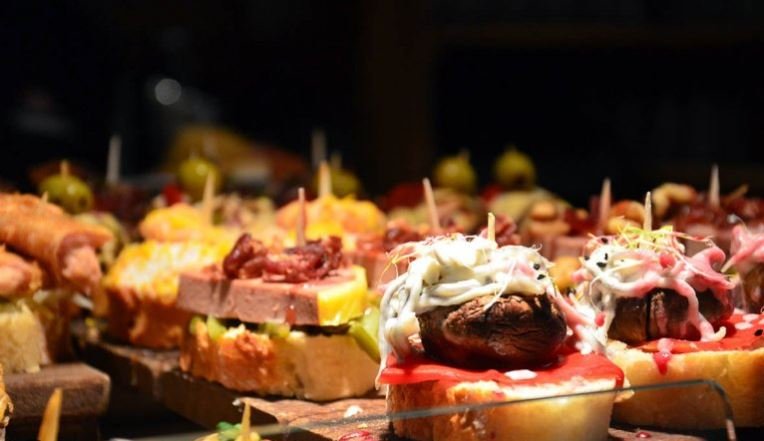Basque cuisine offers a rich and diverse culinary experience that captivates food enthusiasts worldwide. Nestled in the northern part of Spain and stretching into southwestern France, the Basque Country boasts a unique culinary heritage deeply rooted in tradition. In this article, we will explore the vibrant flavors of Basque cuisine, its key ingredients, and the cultural significance behind its dishes.

A Rich Culinary Heritage
First and foremost, Basque cuisine stems from a rich culinary heritage. This region’s cuisine reflects a blend of Spanish and French influences, resulting in a distinctive gastronomic identity. The Basque people take immense pride in their food, and this pride shines through in their dedication to preserving traditional recipes and cooking methods.
Key Ingredients of Basque Cuisine
Moreover, key ingredients play a vital role in Basque cuisine. The region’s proximity to the Atlantic Ocean ensures an abundant supply of fresh seafood, including cod, anchovies, and squid. Additionally, the fertile lands of the Basque Country provide high-quality produce such as peppers, tomatoes, and beans, all of which contribute to the vibrant flavors found in Basque dishes.
Pintxos: The Basque Tapas
Additionally, pintxos stand out as a quintessential element of Basque cuisine. These small, flavorful bites, often enjoyed with a glass of local wine, are a staple in Basque bars and taverns. From simple combinations of bread and anchovies to elaborate creations featuring foie gras and seafood, pintxos showcase the creativity and culinary skills of Basque chefs.
Traditional Basque Dishes
Furthermore, traditional Basque dishes hold a special place in the hearts of locals and visitors alike. One such dish is Bacalao a la Vizcaína, a savory preparation of cod cooked in a rich tomato and pepper sauce. Additionally, Marmitako, a hearty tuna and potato stew, exemplifies the region’s comfort food. These dishes, steeped in tradition, highlight the Basque commitment to using fresh, local ingredients.
Txikiteo: The Social Aspect of Dining
Moreover, the social aspect of dining is deeply ingrained in Basque culture. The tradition of Txikiteo, a bar-hopping experience where friends and family gather to enjoy drinks and pintxos, embodies the communal spirit of Basque dining. This practice fosters a sense of community and allows people to savor a variety of flavors in a convivial setting.
The Influence of Basque Chefs
Additionally, the influence of Basque chefs extends far beyond the region’s borders. Renowned chefs like Juan Mari Arzak and his daughter Elena Arzak have brought international acclaim to Basque cuisine through their innovative techniques and dedication to local ingredients. Their contributions have cemented the Basque Country as a culinary destination.
Basque Desserts and Sweets
Furthermore, Basque desserts and sweets offer a delightful end to any meal. The famous Basque cake, Gâteau Basque, with its rich almond filling, stands out as a beloved treat. Similarly, the region’s sheep’s milk cheese, paired with quince paste, provides a perfect balance of flavors that showcases the simplicity and elegance of Basque culinary traditions.
Wine and Cider Pairings
Moreover, wine and cider pairings play a significant role in enhancing the flavors of Basque cuisine. The region’s unique wines, such as Txakoli, a slightly sparkling white wine, complement seafood dishes perfectly. Additionally, Basque cider, with its crisp and tart profile, pairs beautifully with a variety of pintxos and main courses.
Modern Twists on Traditional Dishes
Additionally, modern twists on traditional dishes have gained popularity in recent years. Innovative chefs experiment with new techniques and ingredients while honoring the essence of Basque culinary traditions. This fusion of old and new keeps the cuisine dynamic and exciting, appealing to both locals and international food enthusiasts.
The Future of Basque Cuisine
Finally, the future of Basque cuisine looks promising as it continues to evolve while maintaining its deep-rooted traditions. Young chefs and culinary innovators draw inspiration from their heritage, ensuring that Basque cuisine remains vibrant and relevant in the global culinary scene. The commitment to quality, sustainability, and creativity will undoubtedly shape the next chapter of Basque gastronomy.
Conclusion
In conclusion, Basque cuisine offers a rich tapestry of flavors and traditions that captivate food lovers around the world. From its key ingredients and traditional dishes to the social dining practices and modern innovations, Basque cuisine showcases a unique and dynamic culinary heritage. As this cuisine continues to evolve, it remains deeply rooted in its traditions, promising a flavorful and exciting future.
